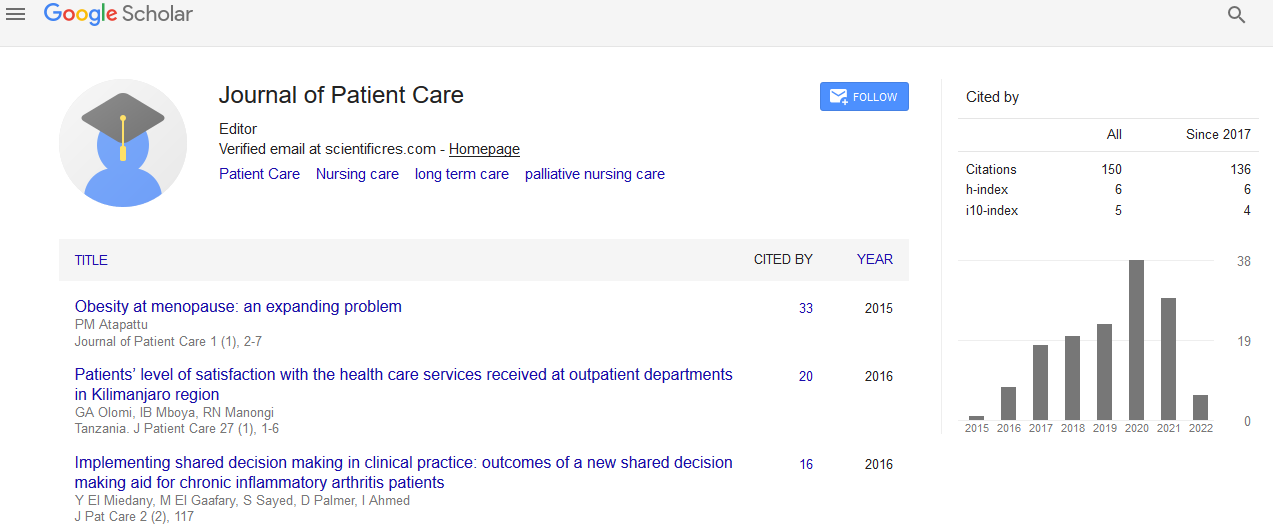Indexed In
- RefSeek
- Hamdard University
- EBSCO A-Z
- Publons
- Geneva Foundation for Medical Education and Research
- Euro Pub
- Google Scholar
Useful Links
Share This Page
Journal Flyer

Open Access Journals
- Agri and Aquaculture
- Biochemistry
- Bioinformatics & Systems Biology
- Business & Management
- Chemistry
- Clinical Sciences
- Engineering
- Food & Nutrition
- General Science
- Genetics & Molecular Biology
- Immunology & Microbiology
- Medical Sciences
- Neuroscience & Psychology
- Nursing & Health Care
- Pharmaceutical Sciences
Are proton pump inhibitors used appropriately in elderly patients
World Congress on Patient Safety & Quality Healthcare
September 07-09, 2017 London, UK
G Jacob
Royal Stoke University Hospital, UK
Posters & Accepted Abstracts: J Pat Care
Abstract:
Background: Proton pump inhibitors (PPI) are a commonly prescribed drug in elderly patients. Although PPI are very useful drugs for appropriate indications, sometimes elderly patients are started or remain on these drugs for unclear indications. Long term use of PPI can increase risk of C. difficile infection and also increase the risk of osteoporotic fractures. Methods: We audited the appropriateness of PPI prescription in patients admitted to our elderly care wards against best practice guidelines. We reviewed the clinical records of all patients in five elderly care wards over a period of one month and identified patients on PPI. Hospital IT (I portal) was checked for any current or previous alerts for C. difficile. Indication for the use of PPI was reviewed against standards and also looked at whether PPI prescription was reviewed or changed during admission Results: We reviewed the prescription charts of 120 elderly patients of which 63 (52.5%) were on PPI. Out of the 63 patients, 59 (93.7%) were started on PPI in the community and 4 (6.3%) were started in hospital. In 44 (69.8%) patients, there was a clear indication for the use of PPI; however, in the remaining 19 (30%), there was no clear indication. The use of aspirin was the commonest indication for the use of PPI (45.5%). Evidence of PPI review was documented only in 22 patients (35%) and out of the patients who had review; changes to prescription were made in six patients (27.2%). Conclusions: A significant proportion of hospitalized elderly patients are on PPI and hospital admission provides an opportunity to review their indications and stop it or reduce the dose or change to ranitidine. If the indications are unclear, it will also be helpful to remind the GP in the discharge summary to review the PPI prescription. We intend to strengthen our PPI review for our patients and pharmacists are alerting the medical team to review the PPI and we are also planning to share the findings with the primary care. Reducing unnecessary PPI prescribing in elderly can have significant benefits in terms of health outcomes and cost saving.
Biography :
G Jacob is working as Consultant Physician and Geriatrician at Royal Stoke University Hospital, UK. After graduating from India, he undertook Post-graduate training in Geriatrics and General Medicine in UK and was appointed as Consultant in 2003. During his Post-graduate training, he did Master’s in Clinical Gerontology at Kings College, London. His special interests include acute geriatrics and frailty. He is actively involved in teaching undergraduate medical students at Keele University Medical School, UK and also a trainer for specialist registrars.

